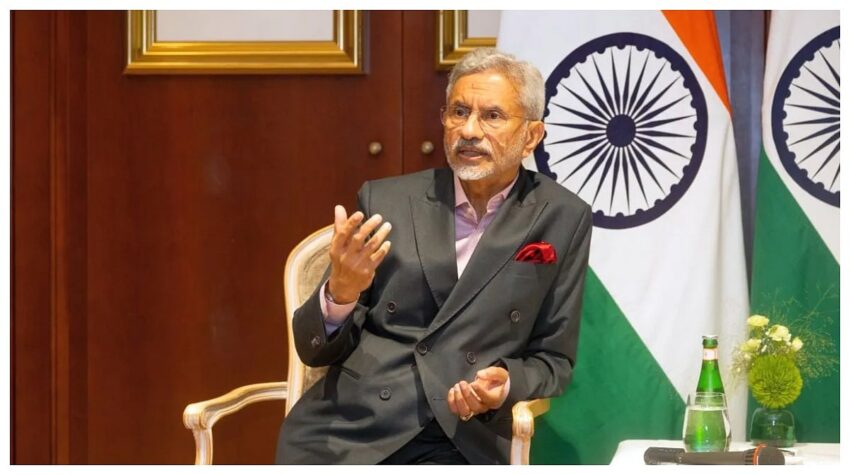New Delhi: Any trade deal between India and the US has to respect New Delhi’s “red lines,” and efforts are underway to reach an understanding, External Affairs Minister S. Jaishankar said on Sunday amid a downturn in bilateral ties over Washington’s tariff policy.
In an interactive session titled ‘Shaping Foreign Policy in Turbulent Times’ at the Kautilya Economic Enclave, Jaishankar acknowledged that there were “issues” between India and the US, many linked to the inability to finalize the proposed trade deal. He noted, “There are things you can negotiate and there are things you can’t.”
The external affairs minister explained that both sides have yet to arrive at a “landing ground” in trade discussions, but an understanding is necessary since the US is the world’s largest market. At the same time, he emphasized that India’s red lines must be respected.
Ties between New Delhi and Washington have been under severe strain after US President Donald Trump doubled tariffs on Indian goods in August, imposing a hefty 50 percent tariff, including a 25 percent additional duty on India’s purchase of Russian crude oil. India described this action as “unfair, unjustified and unreasonable.”
However, a phone conversation between Prime Minister Narendra Modi and President Trump last month paved the way for renewed efforts to work on a proposed trade deal.
“We have today issues with the United States. A big part of it is the fact that we have not arrived at a landing ground for our trade discussions, and the inability so far to reach there has led to a certain tariff being levied on India,” Jaishankar said.
He added, “In addition, there is a second tariff which we have publicly said we regard as very unfair, which has picked on us for sourcing energy from Russia when there are other countries that have done so, including countries that right now have a far more antagonistic relationship with Russia than we do.”
Responding to questions on the current state of India-US relations, Jaishankar said, “Whatever happens at the end of the day, there has got to be a trade understanding with the US… because it is the world’s largest market but also because much of the world has reached those understandings.”
He reiterated, “But it has to be an understanding where our bottom lines, our red lines are respected. In any agreement, there are things you can negotiate and there are things you can’t.”
Jaishankar added that India is clear about its approach. “I think we are pretty clear about that. We have to find that landing ground, and that’s been the conversation which has been going on since March.”
The external affairs minister also suggested that the strain in relations has not impacted every dimension of the engagement between the two countries.
“There are problems, there are issues, nobody is in denial of it. Those issues need to be negotiated and discussed and resolved, which is exactly what we are trying to do,” he said.
At the same time, he cautioned against reading too much into the situation beyond the issues themselves. “I think I also want to say a large part of the relationship is actually continuing either as business as usual or, in fact, in some cases even doing more than it was doing before.”
India and the US recently resumed negotiations for the proposed trade deal after a short hiatus of a few weeks. In the last few months, several rounds of talks were held, but sharp divergences on critical areas such as agriculture and dairy have prevented sealing the agreement.
Addressing the broader geopolitical landscape, Jaishankar said the world is undergoing an “extraordinary and intense period of change.”
“Now, the strategic consequences of this are quite obvious. We have seen a weakening, sometimes even discarding, of international regimes and rules,” he stated.
Economically, he noted that cost may no longer be the definitive criterion. Instead, factors like ownership, security, reliability, and resilience have become equally important.
The external affairs minister highlighted the growing competition over rare earths and critical minerals, describing it as a “major factor.”
“This is today actually setting into motion a paradoxical situation where, on the one hand, the very factors which I referred to encourage higher risk-taking. At the same time, because of the consequence of this, there is a serious effort also to de-risk every facet of both politics and economics,” Jaishankar explained.
In an apparent reference to China, he raised concerns about the consequences of shifting one-third of global manufacturing to a single country.
“We have seen politically that alliances and understandings are being revisited. We’ve also seen in a few cases, in the cases of really the major polities, that their belief in the balance of power is probably much less,” he said.
Regarding finance, Jaishankar pointed to a new level of sanctions enforcement and cited instances of seizure of sovereign assets in recent years.
In this context, he emphasized that India must not only defend what it has but also aim to go beyond and continue its rise.
“For us, just defending what we have is simply not good enough. This has caught us at a time where we had to not only internalize and absorb these risks, but find a way of going beyond and continuing with our rise,” he said.
Touching upon various global conflicts, Jaishankar noted the rapidly changing nature of warfare.
The Azerbaijan-Armenia, Ukraine-Russia, and Israel-Iran conflicts have demonstrated that contactless war is possible with stand-off weapons and can yield decisive outcomes.
*Disclaimer: This story is from a syndicated feed. Nothing has changed except the headline.*
https://www.freepressjournal.in/business/us-must-respect-new-delhis-red-lines-efforts-are-underway-to-reach-an-understanding-external-affairs-minister-jaishankar
